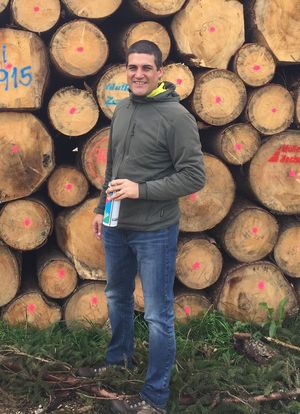- Akos Ivanyi, Ungarn
- Starford Mvula, Zambia
- Behruz Ilnazarov, Tadjikistan
- Lela Kakhniashvili, Georgia
- Carla Ocano, Uruguay
- Alfredo Rodriguez Zunino, Peru
- Rina Kristanti und Yayuk Siswiyanti, Indonesien
- Tibor Kadar, Rumänien
- Noor Hussein, Kenia
- Joaquin Garrido, Uruguay
- Lee Xiong, Laos
- Nehemia Gurusinga, Indonesien
- Edi Kurniadi und Kusdamayanti, Indonesien
- Myroslav Kabal, Ukraine
- Ekatherina Nevmerzhitskaya und Nikolay Nevmerzhitsky, Russland
- Le Xuan Toan, Vietnam
- Li Ming, China
- Ekaterine Balarjishvili, Georgien
- Gamin Gesa und Yopie Parisi, Indonesien
From Peru to Germany, and heading Asia

Insights from the Forest Expert Program in September/October 2017; Alfredo Rodríguez Zunino, Peru
One of my daily activities as a former senior advisor at the GIZ in Peru was to advise the National Forest Service (SERFOR) and other governmental agencies on how to enhance forestry governance between key stakeholders, institutional strengthening and facilitation in functional systems, support the process of developing national forest policy plans and programs while mentoring the implementation of forest regulation pilots and liaise initiatives between stakeholder to promote the forest sector.
In a country like Peru where illegal timber trade is about 40% and deforestation rates are not decreasing, having the task of advising decision-makers at the national forestry service is quite a challenge since issues such as land tenure right’s, monitoring, data management and stakeholder’s coordination are still key to make progress in the forestry industry. Therefore, much has to be done to foster coherence between the decision-making entities at the central government and subnational stakeholders, being them governmental or private entities. This cross-level articulation is a key for building and strengthening forest governance.
To address these issues, I was seeking to learn from related experiences in different countries. After searching for useful experiences around the Latin American region I found an opportunity with the Forest Expert Program in Germany. I then turned my motivation to better understand how the forest authorities in Germany are steering the sector not only in terms of planning and management but also in relation to institutional arrangements.
Between September and October 2017, I spent one month between Bavaria and Berlin and engaged in fruitful discussions with the Bavarian State Ministry of Food, Agriculture and Forestry, the Bavarian State Institute of Forestry, the Berlin City Forest, the German Forestry Council, the German Forest Owners Association and the Bavarian State Forest.
The programme surpassed my expectations. I gained more insights about the federal forest government and the forest industry than during my previous years studying at a university in Germany. The new topics and perspectives on how to deal with the wide array of stakeholders was useful in my daily work allowing me to propose innovative solutions when providing guidance to my peers back in Peru. Also, I noticed that there was an enormous opportunity to promote and support a similar kind of exchange between Germany and Peru. Although latitudes differ, similar features can be derived between both countries in terms of governance, stakeholder engagement, and the way the social organizations engage with the timber industry.
Back in Peru, I shared my Forest Expert Program experience with my colleagues and we proposed to plan a study tour of Peruvian forest officers between Peruvian and German forest institutions. This study tour aimed at fostering mutual knowledge exchange about topics related to forest governance and natural resource management as well as to contribute with innovative ideas to be applied back in Peru supporting the sustainable management of the forests. Then, in 2018 a Peruvian delegation of seven forest officers coming from the Ministry of Environment (MINAM), the National Forest Service (Serfor), the oversight body (Osinfor), and one of the subnational forest offices from the Amazon basin visited Germany as part of this experts’ dialogue.
During the one-week study tour, the Peruvian delegation had the opportunity to exchange experiences with several and different officers from federal and state forest institutions around Bavaria and Berlin. The expert dialogue brought discussions on the mission of the public administration in terms of forest governance, forest land planning and management, capacity strengthen and dual training, civil society participation forums, the political dialogue and the canals to articulate between the different governing levels.
This visit was organised between the DFV and the GIZ office from Peru, and after going through meetings not only in the offices but also in the forest, the Peruvian delegation stated that even taking in consideration the high differences between Peru and Germany there are also some similarities in relation to the challenges for the forest administrations to provide efficient services and promote competitiveness. Also, there are in both countries a high land tenure fragmentation and several interests between the primary and secondary forest users. The most important factors that the Peruvian participants highlighted as drivers of success for the German forest governance were focused on (i) public investment for land forest planning and management as well as (ii) the level of organization for the stakeholder’s communication between private associations.
After two years since my FEP experience, I moved to South Korea for family reasons and I just started to work with forest trends coordinating a program in Asia. This new wide challenge also involves to work with the national forest services and private timber producer’s associations supporting to progress their own timber trade regulations and learning from others experiences. Looking back, I found that the knowledge I had gained through my exchange with the FEP and the Bavarian and Berlin forest institutions has been positive in terms of providing guidance on validated mechanisms and tools for making real progress in the forest arena, but state of the art practices and procedures are needed for appropriately founded decision making.
Alfredo Rodríguez Zunino

